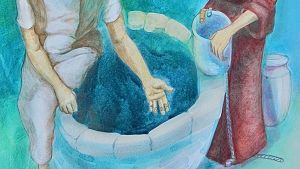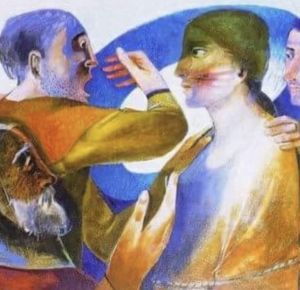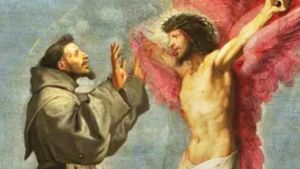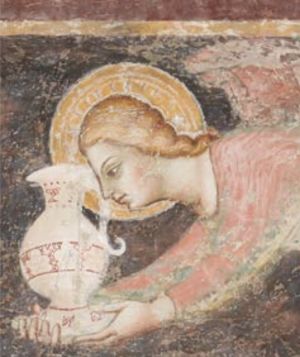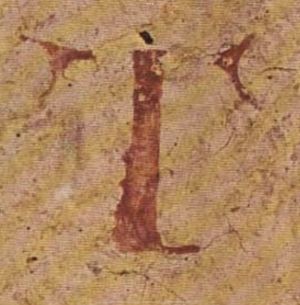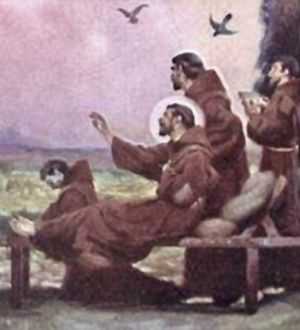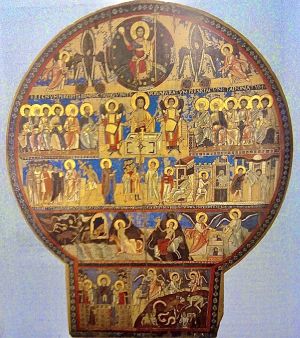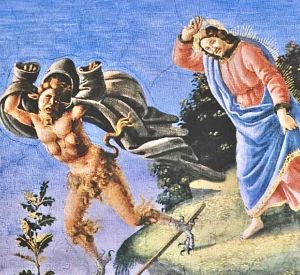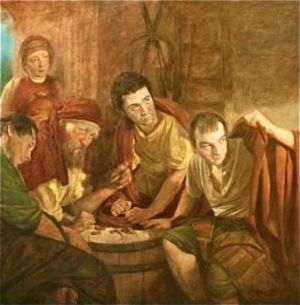
Teresa Girolami
Teresa Girolami è laureata in Materie letterarie e Teologia. Ha pubblicato vari testi, fra cui: "Pellegrinaggio del cuore" (Ed. Piemme); "I Fiammiferi di Maria - La Madre di Dio in prosa e poesia"; "Tenerezza Scalza - Natura di donna"; co-autrice di "Dialogo e Solstizio".
Samaritan woman, Francis, Clare: worship in Spirit and Truth
Proudness in loving
Jesus proposes Perfection according to the Father: loving and forgiving even our enemies makes us sons.
Francis of Assisi often repeated that Love was not loved. Going beyond the considerations of the Old Testament (cf. Lev 19:18), for him one was called to love everyone and not to consider only one's fellow countrymen as neighbour.
«You have heard that it was said, 'You shall love your neighbour and hate your enemy. Now I say to you: love your enemies and pray for those who persecute you» (Mt 5:43-44).
In the writings of the Poor Man of Assisi [Paraphrase of the Our Father] we read:
"As we forgive our debtors:
and what we do not know how to fully forgive, you, Lord, make us fully forgive, so that, for your sake, we may truly love our enemies and devoutly intercede with you, rendering no one evil for evil, and striving in you to be of benefit to all" (FF 273).
In the Letter to a Minister:
"I say to you [...] every person who will be an obstacle to you, whether they be brothers or others, even if they cover you with beatings, all this I must consider as a grace [...].
And in this love them and do not expect them to become better Christians" (FF 234).
All this in order to be children of the heavenly Father, who makes the sun rise on all: good and bad.
Francis, in fact, in front of the scoundrels he met in a forest - while singing the praises of God in French - and who attacked him asking who he was, reacts thus:
"I am the herald of the great King; does this interest you?".
They beat him and threw him into a pit full of snow, saying:
"Stand there, ye herald of God!".
But he, turning this way and that, shaking off the snow, as soon as the brigands are gone, leaps out of the pit and, all joyful, resumes singing in a loud voice, filling the forest with praises to the Creator of all things" (FF 346).
Love your enemies in perfect joy!
Saturday 1st wk. in Lent (Mt 5:43-48)
Merciful Justice
Jesus calls for a non-formal Justice that follows the Father's criterion: seasoned with mercy, respectful.
Francis was a great spiritual teacher, almost without realising it.
He was convinced, by Grace, that justice always goes hand in hand with mercy.
A justice far from legalistic rigidism, eager to express itself in the fulfilment of God's will, in respect for one's brother always.
The Franciscan Sources teach:
"If it sometimes happened that a brother missed a word capable of wounding, the remorse of conscience would not let him have peace, until he confessed his mistake, humbly throwing himself to the ground and begging the offended person to put his foot on his mouth.
If that brother refused to make that gesture, when the offender was his superior, he would command him to put his foot over his mouth; when he was a subject, he would have the person in charge order him to do so.
In this way, the brothers strove to banish all rancour and incompatibility, and to keep the exchange of love intact.
They did all they could to replace every vice with the corresponding virtue, inspired and assisted in this by the Grace of Jesus Christ" (FF 1449).
Justice and Mercy to be sought, to be asked of God first of all in prayer and silence, because a new heart is a gift from the Lord, a continuous exodus.
In the Rule of the Hermitages, written by Francis, we read:
"Let these [the brothers] have a cloister, in which each one has his own small cell, in which he can pray and sleep [...] and get up for matins, and first of all seek the kingdom of God and his justice" (FF 137).
In the same Praises of God Most High, Francis expresses himself thus:
«[...] You are justice,
You are temperance,
You are all our riches enough» (FF 261).
The Poverello, knowing that the Lord-Justice called for a greater justice than that of manner, worked hard for the kingdom of heaven and tried to teach his brothers to do the same.
He never forgot that mercy always prevails in judgement before God.
«For I tell you, unless your righteousness abounds more [than that] of the scribes and Pharisees, you will not enter the kingdom of heaven» (Mt 5:20)
Friday 1st wk. in Lent (Mt 5,20-26)
Franciscan Transfiguration: without applause
Knock: it will be opened to you!
The Matthew passage emphasises the goodness of the Father, who does not give a stone to the son who asks for bread. Then here is the golden rule: what one wants for oneself, it is good to do for others.
For Francis of Assisi, giving to those in need was a law of life. This verb, 'to give', was often replaced by another typically Franciscan one: 'to give back'.
For him, handing over his cloak to a poor man who knocked on the door of his heart meant giving back what he had lent.
On the other hand, as the Gospel says, what we wish to be done to us, we must also do to our neighbour (cf. Mt 7:12).
At the same time, he considered it important and a sign of humility to know how to ask.
After his change of life, obeying the voice of the Crucifix of San Damiano and overcoming himself, he gave himself to countless labours.
The Sources narrate:
"Francis, a man of God, naked of the things of the world, consecrated himself to divine worship and, no longer minding his own advantage, committed himself to serving God in every way possible.
Returning to the church of St Damian, all happy and fervent, he put on a hermit's habit and comforted the priest of that church with the same words of encouragement addressed to him by the bishop.
Then, returning to the city, he began to walk through squares and streets, raising praises to the Lord with an inebriated soul.
As he finished his praises, he worked to obtain the stones needed to restore the church. He would say:
«Whoever gives me one stone, will have one reward; whoever gives me two stones, two rewards; whoever gives me three, as many rewards!».
With ardent enthusiasm he made this and similar appeals full of naivety, for this chosen one of God had a candid and childlike soul, he did not resort to the learned language of human wisdom, but was simple and immediate in everything" (FF 1420).
According to the Poverello, begging for the love of God was the noblest and most dignified gesture before the Lord and the world.
"And indeed, everything the heavenly Father has created for the benefit of mankind, he continues to give to us gratuitously even after sin, to the worthy as well as the unworthy, out of love for his beloved Son" (FF 1610).
«Ask and it will be given to you, seek and you will find, knock and it will be opened to you» (Mt 7:7)
Thursday 1st wk. in Lent (Mt 7,7-12)
The only Sign
In Lenten season, liturgy emphasises the importance of changing one's life, without going for signs.
One 'sign': that of the Crucified One, of Jesus who died and rose again for all.
By derivation, an eloquent sign becomes an existence converted to the praise of God.
According to St Bonaventure, Francis is symbolised in the figure of the second angel [the first is Christ] who ascends from the east (cf. Rev 7:2) and bears within him the seal of the living God.
This is confirmed by his mission to call men to penance and mark the elect with the sign of the Tau*, and above all by his being himself transformed, even in body, into the Crucified Christ.
«This generation [...] seeks a sign, but no sign will be given it except the sign of Jonah» (Lk 11:29)
The Sources attest:
"This herald of God, worthy to be loved by Christ [...] is the servant of God Francis [...] an example of perfection for the followers of Christ.
We are moved to embrace, with faith and piety, this conviction by the fact that he had the mission from heaven to call men to weep, to mourn, to shave their heads and to gird their loins, and to impress, with the sign of the penitential cross and with a habit made in the shape of a cross, the Tau on the foreheads of those who weep and mourn.
But he confirms in it, with its incontestable truth, the testimony of that seal that made him like the living God, that is, like Christ Crucified. A seal that was imprinted in his body not by the work of nature or the skill of an artificer, but rather by the marvellous power of the Spirit of the living God" (FF 1022).
The Crucifix in Francis: icon of rebirth through a continuous existential exodus. A life marked by the love of God.
* Letter of the Hebrew and Greek alphabet, whose shape recalls the figure of the cross.
* Francis chose it as his seal and signature. Brother Pacifico contemplated it shining on his forehead.
Wednesday 1st wk. in Lent (Lk 11:29-32)
Treasury of Prayer
Jesus invites his disciples to a prayer that is not long-winded, but bare, essential; as children.
Although in different paradigms, Clare and Francis of Assisi were aware that in the depths of their being lurked a secret to be found in order to be reborn and healed.
To the point that, distancing himself from his earthly father, before the local bishop, the Poverello expressed himself thus:
"Hitherto I have called you, my Father on earth; from now on I can say with all confidence: OUR FATHER, WHO IS IN HEAVEN, because in Him I have placed all my Treasure and placed all my Trust and Hope" (FF 1043).
To his brothers who asked him to teach them how to pray, he replied:
"When you pray, say: Our Father, and [...] We adore you, O Christ, in all your churches that are in the whole world, and we bless you, because through your holy Cross you have redeemed the world" (FF 1068).
And in the paraphrase of the "Our Father" we find:
"Hallowed be thy Name: let the knowledge of Thee be made bright in us, that we may know the breadth of thy benefits, the extent of thy promises, the sublimity of thy majesty and the depth of thy judgments" (FF 268).
A prayer, therefore, attested by life, by the capacity for forgiveness, in Listening.
All in the cell of one's own body, Francis maintained - as the Perugina Legend reminds us:
"Wherever we are or move, we take our cell with us: brother body; the soul is the hermit who lives in it praying to God and meditating.
And if the soul does not live serenely and solitarily in its cell, it is of little use to the religious to have a cell erected by the hand of man" (FF 1636).
And in the Legend, Clare herself:
"How much strength and support she received in the furnace of ardent prayer [...] she brought back from the fire of the altar of the Lord burning words, such as to inflame the hearts of the sisters" (FF 3199).
A prayer not marked by the multiplication of words, but by an authentic and profound relationship with God, who knows everything.
«When you pray, do not babble like the pagans, for they think they will be heard because of their wordiness» (Mt 6:7)
Tuesday 1st wk. in Lent (Mt 6,7-15)
Come ye Blessed!
When the nations are gathered before the Lord, the works of blessing performed will speak for them.
They will be in the divine condition those who recognised Christ himself in the needy of all kinds, perhaps without having realised it.
They will not be in the eternal Light who did not serve the small and infirm.
Francis, a creature of noble and sensitive heart, from his youth, before the poor felt in his conscience the need not to turn away.
This tender inclination increased considerably after meeting the Lord.
We read in the Sources stupendous documentation of real life.
"God, in fact, had infused the young Francis' soul with a feeling of generous compassion, which, growing with him from childhood, had filled his heart with goodness; so much so that even then, not a deaf hearer of the Gospel, he was willing to give to anyone who asked him, especially if he asked for the love of God.
Once, all busy in his shop, he sent away empty-handed, against his custom, a poor man who asked for alms for the love of God. But immediately, coming to his senses, he ran after him, gave him a generous alms, and promised the Lord God that from then on, when he had the chance, he would never say no to anyone who asked him for the love of God.
And he observed this intention until his death, with untiring piety, deserving to grow abundantly in the love of God and in Grace.
In fact, he would later say, when he was perfectly clothed with the sentiments of Christ, that even when he was living as a secular, he could hardly hear the love of God mentioned without feeling an inner turmoil" (FF 1018).
«Come, ye blessed of my Father [...] for I was hungry and you gave me food» (Mt 25:34)
The Sources also tell of a woman who came from Machilone to Rieti to have her eyes treated.
The doctor, who went to Francis, told him about this poor creature, claiming that he would cure her free of charge and pay the expenses himself.
The Poor Man, then, immediately went to his guardian, claiming that he had to return the goods of others.
The superior asked him what he was referring to and Francis replied:
"This is the cloak we borrowed from that poor woman who is sick of her eyes: we must return it to her" (FF 1602).
The guardian agreed.
Then the Minim called a spiritual man, with whom he was intimate. He handed him the cloak and twelve loaves, urging him to go to the oculist and have him point out the poor woman to whom he should hand it.
"Go and say to that poor and infirm woman: 'The poor man, to whom you have lent this cloak, thanks you from his heart for the loan you have made. And now, take what belongs to you'" (FF 1602).
The friend did as the saint had suggested. The woman, unable to make up her mind and in distress and suspicion, replied: 'Leave me alone. I don't know what you are saying' (FF1602).
But the man put the cloak and the twelve loaves into his hand. Then the poor woman was convinced that he meant what he said, confused between worry and happiness. Fearing, then, that the help she had received would be taken away from her, she went back to her house at night.
Francis had instructed his guardian to pay the poor sick woman's expenses every day as long as she remained in Rieti.
The Sources also underline what his brothers attested:
"We who lived with him can testify that Francis, whether healthy or infirm, overflowed with love and tenderness not only for his brothers, but towards all the poor, both healthy and sick.
He deprived himself of the necessities, which the brothers procured for him with solicitude and affection - not without showing himself caressed by us, so that we would not be disappointed - in order to offer them with great joy to others, taking from his own body even that which was indispensable" (FF 1602).
Charity speaks for itself!
«Come, ye blessed of my Father, inherit the kingdom [...] for I was hungry and you gave me food» (Mt 25:34)
Monday 1st wk. in Lent (Mt 25:31-46)
Desert, solitude, adoration
The enemy suggests to the Son of God a different way from the Father, but Jesus shrugs off that stench.
Francis' life had undergone a radical change when the Physician Jesus had spoken to him.
The Poor Man had realised that he was loved and that, by following Him, he would be healed from self-worship to render it to God alone.
The Crucifix at San Damiano and the leper he had met had changed him inwardly.
The Minim of Assisi devoted himself to frequent fasts and nights in prayer, for periods of forty days (in consonance with the forty days Jesus spent in the desert).
He did this often - apart from the period before Easter.
At those times he would suspend his apostolic commitments, retiring to hermitages: simple and austere places, far from the cities.
There, as his biographer Celano recalls, he would build his nest in the clefts of the rock*.
The Sources chronicle his Lenten periods, where he was often put to the test.
"Two years before he rendered his spirit to God, after many and various labours, divine Providence drew him aside and led him to a lofty mountain, called the mountain of La Verna.
Here he had begun, according to his custom, to fast during Lent in honour of St Michael the Archangel, when he began to feel flooded with extraordinary sweetness in contemplation, inflamed by a more lively flame of celestial desires, filled with richer divine gifts [...] intent on seeking God's will, to which he yearned with the greatest ardour to conform himself in everything" (FF1223).
La Verna was par excellence "the desert" of Francis, where, as happened to Jesus in arid places, he was subjected to oppressive temptations.
While the Saint was in prayer, there "came a great multitude of ferocious demons [...] and they began strongly to fight and vex him" (FF 1901).
But he began to shout aloud:
"«O damned spirits, you can do nothing except as much as the hand of God permits you [...] And I am prepared to cheerfully endure every punishment and every adversity that you, my God, want to send me for my sins».
Then the demons, confused and overcome by his constancy and patience, departed" (FF 1901).
He fed more than on material bread on that of the Holy Word and taught his brothers to adore God alone, wherever they were, trusting in divine care and solicitude.
In fact, his sons, faithful to Francis' exhortation, when they passed near a church, would stop and prone, with body and spirit, adore the Almighty, saying: «We adore you, O Christ, in all your churches» (FF 401).
The power of the Holy Spirit placed them in the right attitude of need, before power or success, just as Christ had instructed them, without allowing themselves to be caged by such seductions.
«It is written: The Lord thy God shalt thou worship, and him only shalt thou worship».
«And the Spirit drove him into the wilderness, and he was in the wilderness tempted by the satan, and was with the beasts»
*Famous is the hermitage of the Carceri, near Assisi; in reality Francis created twenty in central Italy.
[1st Sunday in Lent]
Minority and mirrors
Levi's call and sharing the table with him produced scandal among the Pharisees, but Jesus taught them that it is the sick who need the doctor!
Francis and Clare saw in their vocation and that of the brothers and sisters who followed them an attractive and fundamental appointment in their existence.
Through the Call, God was realising a secret gift in them, far beyond the expectations of a petty life.
Regarding Francis, we read in the Sources:
As he was passing near the church of St Damian, he was inspired to enter it. He went there, and began to pray fervently before the image of the Crucifix, who spoke to him with moving goodness:
"Francis, do you not see that my house is falling down? Go, then, and restore it".
Trembling and astonished, the young man replied:
"I will do it gladly, Lord".
However, he had misunderstood; he thought it was about that church which, because of its antiquity, threatened imminent ruin.
At those words of Christ he became immensely happy and radiant; he felt in his soul that it was really the Crucified One who had given him the message.
As he left the church, he found a priest sitting nearby, and putting his hand in his purse, he offered him money, saying:
"Sir, I beg you to buy oil to make a lamp burn before that Crucifix. When this money is finished, I will bring you more, according to need" (FF 1411).
The Poverello, considering minority as a specific vocation of the Friar, was worried because "he saw that some ardently desired the offices of the Order, of which they made themselves unworthy, apart from anything else, even for the mere ambition to govern. And he said that these were not Friars Minor, but had forgotten their vocation and had fallen from glory" (FF 729).
Clare, regarding the vocation of the sisters residing at San Damiano, also expressed herself in her Testament as follows:
"The Lord himself has placed us as a model, as an example and mirror not only for other men, but also for our sisters, those whom the Lord himself has called to follow our vocation, so that they too may shine as a mirror and example for all those who live in the world" (FF 2829).
«I did not come to call the righteous, but sinners to conversion» (Lk 5:32)
Saturday after the Ashes (Lk 5:27-32)
Anyone who welcomes the Lord into his life and loves him with all his heart is capable of a new beginning. He succeeds in doing God’s will: to bring about a new form of existence enlivened by love and destined for eternity (Pope Benedict)
Chi accoglie il Signore nella propria vita e lo ama con tutto il cuore è capace di un nuovo inizio. Riesce a compiere la volontà di Dio: realizzare una nuova forma di esistenza animata dall’amore e destinata all’eternità (Papa Benedetto)
You ought not, however, to be satisfied merely with knocking and seeking: to understand the things of God, what is absolutely necessary is oratio. For this reason, the Saviour told us not only: ‘Seek and you will find’, and ‘Knock and it shall be opened to you’, but also added, ‘Ask and you shall receive’ [Verbum Domini n.86; cit. Origen, Letter to Gregory]
Non ti devi però accontentare di bussare e di cercare: per comprendere le cose di Dio ti è assolutamente necessaria l’oratio. Proprio per esortarci ad essa il Salvatore ci ha detto non soltanto: “Cercate e troverete”, e “Bussate e vi sarà aperto”, ma ha aggiunto: “Chiedete e riceverete” [Verbum Domini n.86; cit. Origene, Lettera a Gregorio]
In the crucified Jesus, a kind of transformation and concentration of the signs occurs: he himself is the “sign of God” (John Paul II)
In Gesù crocifisso avviene come una trasformazione e concentrazione dei segni: è Lui stesso il "segno di Dio" (Giovanni Paolo II)
Only through Christ can we converse with God the Father as children, otherwise it is not possible, but in communion with the Son we can also say, as he did, “Abba”. In communion with Christ we can know God as our true Father. For this reason Christian prayer consists in looking constantly at Christ and in an ever new way, speaking to him, being with him in silence, listening to him, acting and suffering with him (Pope Benedict)
Solo in Cristo possiamo dialogare con Dio Padre come figli, altrimenti non è possibile, ma in comunione col Figlio possiamo anche dire noi come ha detto Lui: «Abbà». In comunione con Cristo possiamo conoscere Dio come Padre vero. Per questo la preghiera cristiana consiste nel guardare costantemente e in maniera sempre nuova a Cristo, parlare con Lui, stare in silenzio con Lui, ascoltarlo, agire e soffrire con Lui (Papa Benedetto)
In today’s Gospel passage, Jesus identifies himself not only with the king-shepherd, but also with the lost sheep, we can speak of a “double identity”: the king-shepherd, Jesus identifies also with the sheep: that is, with the least and most needy of his brothers and sisters […] And let us return home only with this phrase: “I was present there. Thank you!”. Or: “You forgot about me” (Pope Francis)
Nella pagina evangelica di oggi, Gesù si identifica non solo col re-pastore, ma anche con le pecore perdute. Potremmo parlare come di una “doppia identità”: il re-pastore, Gesù, si identifica anche con le pecore, cioè con i fratelli più piccoli e bisognosi […] E torniamo a casa soltanto con questa frase: “Io ero presente lì. Grazie!” oppure: “Ti sei scordato di me” (Papa Francesco)
Thus, in the figure of Matthew, the Gospels present to us a true and proper paradox: those who seem to be the farthest from holiness can even become a model of the acceptance of God's mercy and offer a glimpse of its marvellous effects in their own lives (Pope Benedict))
Nella figura di Matteo, dunque, i Vangeli ci propongono un vero e proprio paradosso: chi è apparentemente più lontano dalla santità può diventare persino un modello (Papa Benedetto)
duevie.art
don Giuseppe Nespeca
Tel. 333-1329741
Disclaimer
Questo blog non rappresenta una testata giornalistica in quanto viene aggiornato senza alcuna periodicità. Non può pertanto considerarsi un prodotto editoriale ai sensi della legge N°62 del 07/03/2001.
Le immagini sono tratte da internet, ma se il loro uso violasse diritti d'autore, lo si comunichi all'autore del blog che provvederà alla loro pronta rimozione.
L'autore dichiara di non essere responsabile dei commenti lasciati nei post. Eventuali commenti dei lettori, lesivi dell'immagine o dell'onorabilità di persone terze, il cui contenuto fosse ritenuto non idoneo alla pubblicazione verranno insindacabilmente rimossi.


